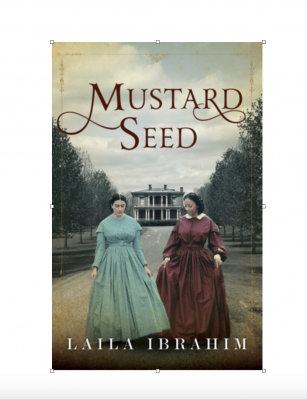Mustard Seed – Laila Ibrahim
 (March 2018) We don’t get to pick how big our good gets to be, but each of us picks if we gonna do some good right where we are.”– Mattie Freedman
(March 2018) We don’t get to pick how big our good gets to be, but each of us picks if we gonna do some good right where we are.”– Mattie Freedman
One of my favorite passages from this remarkable book.
Mustard Seed is a sequel to Ibrahim’s Yellow Crocus, and as historical fiction goes, it’s outstanding. The narrative of both books unfolds in Virginia. And the author captures so vividly the lives of slaves both before the Civil War and the injustices done to them afterward.
While attending a session at the SXSW Education conference today on Black Education in America, the very wise Dr. Howard Fuller of Marquette University made this observation: “There is a difference between being liberated and being free.” It sent a shiver up my spine for how it perfectly captured the story of Mustard Seed.
In the 1850s, Mattie escapes Fair Oaks Plantation with her daughter Jordon to join her husband Emanuel and their son Samuel who earlier escaped to the free state of Ohio. Returning to Virginia in 1868 to extricate her newly “freed” cousin Sarah from the plantation, Mattie and her family experience some of the most egregious oppressions of Reconstruction. Slavery did not end with the Emancipation Proclamation. Slavery transformed into mass incarceration. As evident in Virginia today as it is in many other parts of the United States.
There were moments in this book that made me want to scream out loud. It truly touched a raw nerve after a floor speech by Del. Nick Freitas (R-Culpeper) on Friday, March 2nd, that threw the House of Delegates into chaos. In his remarks are the historic echoes of enraged white men – as if it was transferred genetically from one generation in Virginia to the next.
Today, I watched on YouTube as three African American Delegates stood on the floor of that same House chamber and addressed Delegate Freitas’s remarks. Delegates Luke Torian, Delores Quinn and Lamont Bagby pushed back. As they should. Because the story of what happened in Richmond in the past few days is not so different from the story this book tells. Racism, oppression and injustice is woven in the fabric of Virginia’s culture.
Our history does not have to define our future. However, ignorance of our history most assuredly allows past wrongs to go unacknowledged and ignorance to be perpetuated by future generations. Historical fiction has a place in education when it is based on thorough research and grounded in factual and verifiable accounts. You feel what the characters are going through, not just absorbing a recounting of events.
I highly recommend this book to anyone who can read and everyone who considers themselves a Virginian.